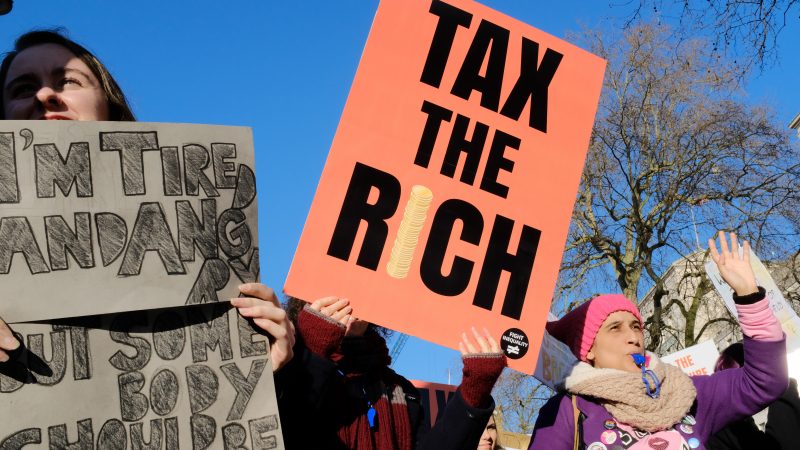
Wealth is now emerging as a key political battle ground with Labour resisting growing calls for a wealth tax.
Private wealth holdings have surged. They stand at more than six times the size of the economy, up from three times in the 1970s. This sustained wealth boom has been a party open only to the few. While aggregate wealth in the UK grew by £5.68 trillion between 2010 and 2018, the poorest half gained just 6% of this rise.
An economy geared to enrichment of the few is not a recipe for a dynamic and stable democracy. The patron saint of economics, Adam Smith, warned in 1759 of how the rich use their power to rig economies in their interest. Far from a reward for a more productive and innovative economy, many of today’s largest fortunes have been driven by predatory and extractive business methods, with a growing number of large companies turned into cash cows or private fiefdoms. Large parts of the economy have been turned into a system of open cheques for the few. This is one of the key explanation for Britain’s low productivity, low growth and low investment economy.
A return to the Victorian era
Real wealth creation that boosts entrepreneurship and builds social infrastructure is vital for rising prosperity. But ‘creating wealth’ is a slippery concept. The founding economists drew an important distinction between new wealth creation that contributes to the common good, and extraction of existing wealth that serves the interests of a powerful few. Such ‘appropriation’ was widespread in the Victorian and inter-war eras, less prevalent in the post-war era of social democracy, but has returned since the early 1980s.
Subscribe here to our daily newsletter roundup of all things Labour – and follow us on Bluesky, WhatsApp, Threads, X or Facebook.
One of the most damaging effects of the role of extraction in Britain’s process of wealth accumulation has been to steer precious national resources – the workforce, land and capital infrastructure – into low value activity. Scarce land and building resources are used to construct walls of multi-million pound luxury flats and mansions, often bought for speculative purposes by the mobile super-rich. It hosts vast and lucrative industries, from tax avoidance to lobbying, whose sole purpose is to protect the wealth of the super-wealthy.
The result is a return to the Victorian era of over-consumption by the rich and under-consumption on the everyday goods that sustain decent opportunities. ‘The test of our progress is not whether we add more to the abundance of those who have much,’ declared the American President, Franklin D. Roosevelt in 1936, ‘It is whether we provide enough for those who have too little.’ Yet Britain’s capacity to meet essential needs – from children’s services to social and health care and adequate social housing – has plunged.
A strategy for sharing wealth
Despite the growing importance of the role played by wealth in the economy, the income from capital (on dividends, capital gains and inheritance) is much less heavily taxed than income. Take the role of inheritance on the shape of the economy and the growing divide in life chances. While the economic weight of such transfers continues to rise, only 3.7 per cent of deaths in the UK result in an inheritance tax charge. ‘A power to dispose of estates forever is manifestly absurd’ declared the patron saint of economics, Adam Smith, 250 years ago. ‘The earth and the fulness of it belongs to every generation, and the preceding one can have no right to bind it up from posterity.’
The debate around wealth taxes has been largely about the need to boost revenue for national renewal. Yet there is a much wider case for tackling the malign impact of today’s pro-rich model of wealth accumulation, including the need to correct for the way today’s booming wealth pool is overwhelmingly privately owned. Indeed the share held in common has fallen from 30% in the 1970s to 10% today.
A strategy for sharing wealth more evenly should be at the heart of Labour’s programme. How this high profile political conflict – over how wealth is acquired and shared – is resolved will have deep implications for both economic strength and social resilience but also Labour’s political soul.
- SHARE: If you have anything to share that we should be looking into or publishing about this story – or any other topic involving Labour– contact us (strictly anonymously if you wish) at [email protected].
- SUBSCRIBE: Sign up to LabourList’s morning email here for the best briefing on everything Labour, every weekday morning.
- DONATE: If you value our work, please chip in a few pounds a week and become one of our supporters, helping sustain and expand our coverage.
- PARTNER: If you or your organisation might be interested in partnering with us on sponsored events or projects, email [email protected].
- ADVERTISE: If your organisation would like to advertise or run sponsored pieces on LabourList‘s daily newsletter or website, contact our exclusive ad partners Total Politics at [email protected].




More from LabourList
‘What Batley and Spen taught me about standing up to divisive politics’
‘Security in the 21st century means more than just defence’
‘Better the devil you know’: what Gorton and Denton voters say about by-election